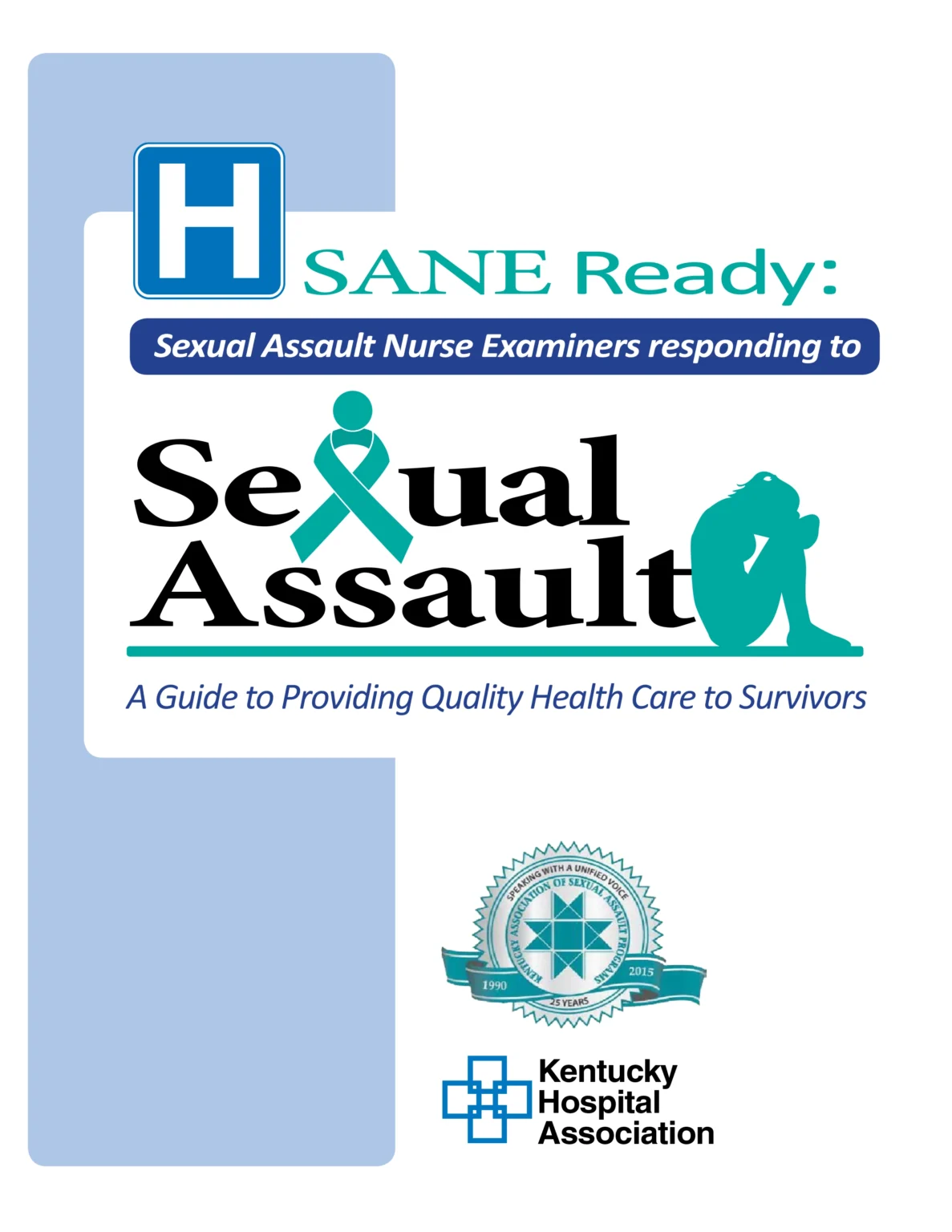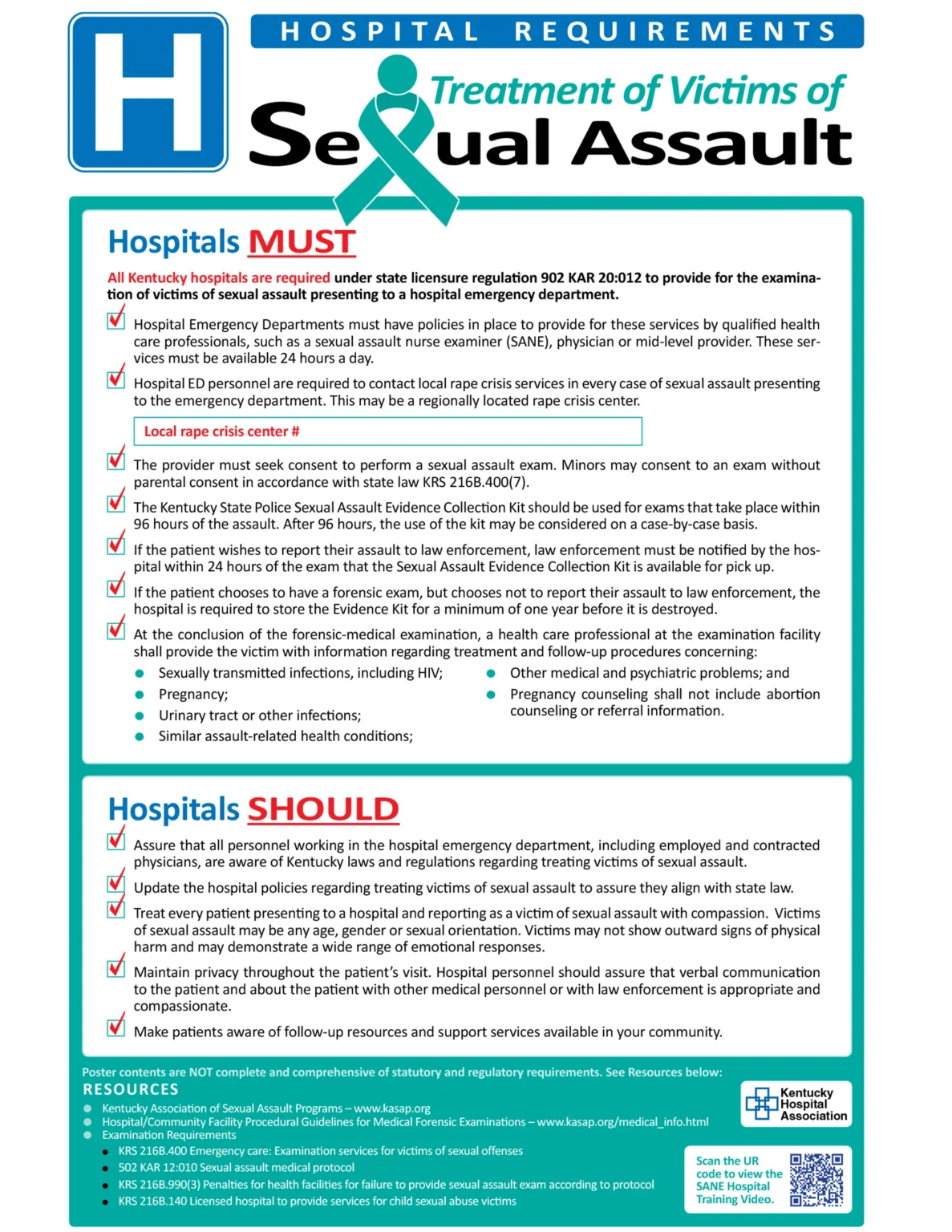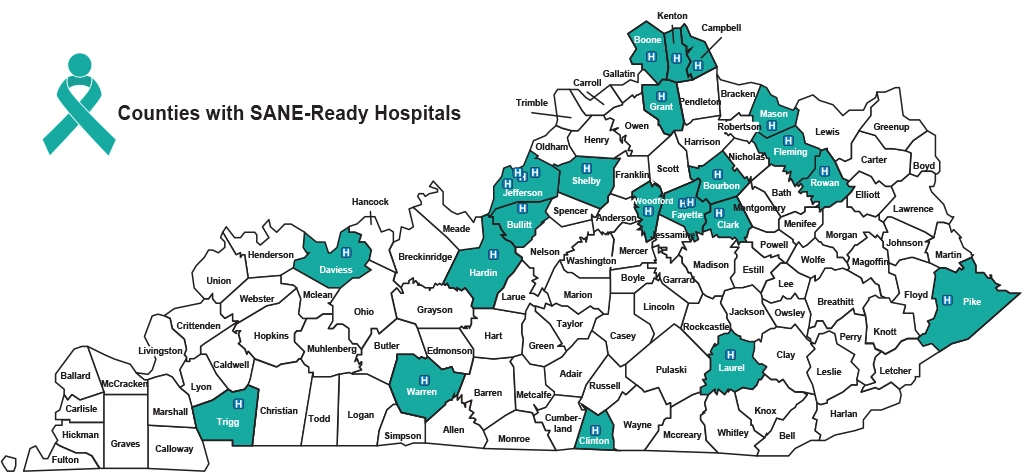Home Focus Areas Sexual Assault Response
Sexual Assault Response
KHA is committed to helping the commonwealth’s hospitals serve the needs of their communities at all times, especially when people need them the most. Every acute care hospital providing emergency services is required by Kentucky law to respond to patients presenting as a victim of sexual assault by (1) providing an examination by an appropriate medical professional, (2) collecting evidence of the assault with consent of the patient, (3) reporting the event and transfering evidence to law enforcement with consent of the patient, (3) providing prophylaxis and treatment against sexually transmitted diseases and (4) notifying the rape crisis center. Hospitals across the state are working to better serve victims of sexual assault at any hour of the day.
The resources below will help hospitals meet the regulatory requirements every hospital emergency department must follow in Kentucky. There are also resources to guide hospitals in obtaining certification as Sexual Assault Nurse Examiner (SANE)-ready facilities. A SANE is a registered nurse with advanced training in the forensic examination of sexual assault victims and is credentialed by the Board of Nursing. Hospitals can be designated as SANE-ready facilities after successfully demonstrating readiness to provide round-the-clock response for sexual assault victims. Hospitals must care for patients who are victims of sexual assault and collect evidence (with patient consent) regardless of the availability of a SANE nurse at the hospital and regardless if the hospital is designated as SANE-ready.
SANE-Ready Hospitals
April 2025
Resources

SANE-Ready Hospital Guide
KHA created this booklet for hospitals to learn how and why they should become designated as a SANE-ready facility.

Sexual Assault Treatment Poster
KHA provides this poster for hospitals across the state, which details the hospital requirements for treatment of victims of sexual assault. Professionally printed and laminated copies for your facility are available.
Education
- Kentucky medical protocol for child sexual assault/abuse evaluation
- Kentucky medical protocol for child/adolescent sexual assault/abuse evaluation flow chart
- Appendices for the Kentucky medical protocol for child sexual assault/abuse evaluations
- Physical examination and evidence collection resources
- HIV Nonoccupational exposure and nonoccupational exposure prophylaxis (nPEP) information
- STI information
- Discharge planning
Regulations & Policies for Hospitals
- 502 KAR 12:010: Sexual Assault Forensic-Medical Examination Protocol, first passed 1999, amended 2011 (NOTE: timeframe for destruction of samples not consistent with 2016 law, the statute takes precedence)
- 2016 KRS 216b.400 (Updated in 2016): Requires hospitals that offer emergency services to have a physician or other qualified medical professional, available on call 24 hours a day for the examination of victims of sexual offenses. Requires the examination to be performed under a statewide medical forensic protocol to include basic treatment, sample gathering and lab tests as appropriate. Payment is to be made by the Crime Victim’s Compensation Board and the victim cannot be billed for the sexual assault examination by the hospital, physician, or other qualified medical professional. Samples collected where the victim does not immediately report to law enforcement may be destroyed after 1 year elapses.
- Regulation on hospital examination services (1990): Requires development of procedures for 24-hour on-call responsibility of medical staff and gathering and handling of physical evidence in accordance with the procedures of the Kentucky State Police Central Crime Laboratory (see regulation on sexual assault forensic-medical examination protocol). 502 KAR 012.010
- Law requiring hospitals to treat child sexual abuse victims, 1992
- KBN law: 314.011 and 314.142 – Creates a Sexual Assault Nurse Examiner Program through administrative regulations, 1996; amended in 2025
- KBN regulation on Sexual Assault Nurse Examiner Program: Standards and credential requirements
- Law establishing the Crime Victim’s Compensation Fund (1982): Fund pays for sexual assault examinations performed by hospitals
- Sexual Assault Examination Program (KY Public Protection Cabinet)
- Kentucky Child Sexual Abuse Medical Protocol and Resources (Children’s Advocacy Centers of Kentucky)
- Emergency Department Responsibilities Checklist
- Toolkit for Safe Exam Access: Making Sexual Assault Forensic-Medical Exams Available to All Victims – Kentucky Sexual Assault Response Team Advisory Committee (July 2018)
- HIV NPEP Plan of Action for Victims of Sexual Assault in Kentucky – Kentucky Council on Domestic Violence and Sexual Assault and the Sexual Assault Response Team Advisory Committee
SANE
The International Association of Forensic Nurses (IAFN) has introduced the TeleSAFE Toolkit: A Step-by-Step Guide to a Trauma-Informed Program, the first comprehensive resource for this emerging area of forensic nursing practice.
- How to Obtain, Renew, or Reinstate a SANE Credential (Kentucky Board of Nursing)
- Kentucky Association of Sexual Assault Programs
- SANE-Ready Hospital Designation: A voluntary process for hospitals, but does not eliminate a hospital’s requirement to perform a sexual assault examination
- OIG List of SANE-Ready Hospitals in Kentucky: This page from the Kentucky Office of the Inspector General (OIG) contains links for lists of health care facilities, including those with the SANE-Ready designation. This list is only updated annually; thus, it may be out of date depending upon the date you access it.

Questions?
Deborah Campbell
Vice President, Clinical Strategy and Transformation
(502) 992-4383
dcampbell@kyha.com


